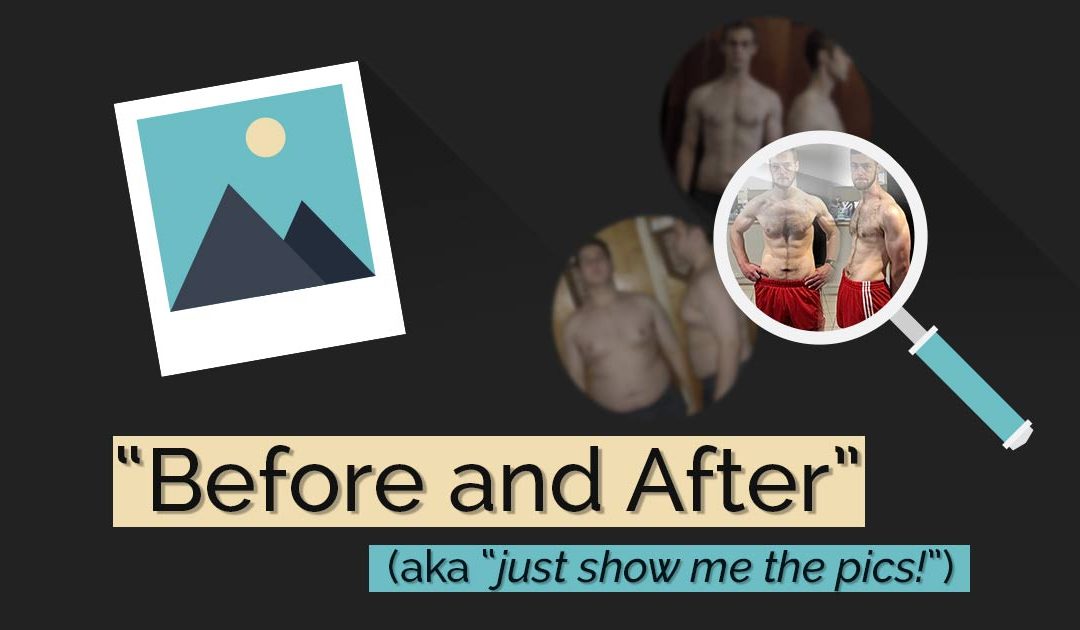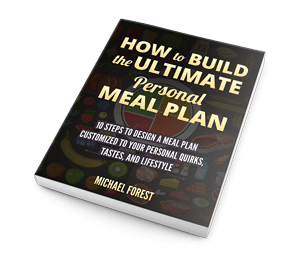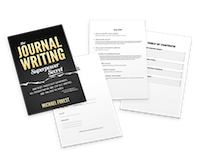From an iTunes review of the Smarter Sculpted Physique podcast:
So much informative and useful content as well as fun to listen to. Scott, Kevin & Mike do an excellent job in bringing forth their knowledge and expertise. I'm looking forward to hearing more. I'd also really like to see a before and after picture of Mike. [my emphasis] All the best to you guys!!
— Matt7782
Matt7782, first, thank you for listening to the podcast and for the review.
I've actually thought about posting some of these pics for awhile, but I've been holding back. Your review has pushed me over the edge. So: thank you.
Honestly, yes, I do feel a bit self-conscious posting shirtless pics online (it can be a little self-indulgent or even narcissistic), but that's not the main reason I've held back.
The reason I've held back is I feel very ambivalent about the the fitness industry and the impact it has, and I want to be careful how I contribute to that impact. This is especially true in light of almost all the recent obesity research I've read, certain truths about weight loss success rates, metabolic compensation, and so on.
These three facts sum up my main feelings:
- Dieting to lose fat can actually make you gain fat, by re-programming your body's metabolic setpoint. That is an established fact, backed by research.
- The fitness industry, in our culture, through supposedly empowering messages about “health” and “motivation,” actually ends up promoting serious problems related to body image. That's also a fact.
- Point 1 and 2 work in tandem and get people caught in very bad feedback loops of dieting and self-recrimination and guilt.
I know, I know.
Most people already get it. I don't want to sound like a broken record, but I also don't want to contribute to either of those things by presenting a “before and after” that leaves out some really important realities.
Also, there's nothing worse than someone who loses either a lot or a little bit of weight, puts up photos, and with absolutely zero self-awareness, is suddenly all like, “Rah rah anyone can do it, ya just need willpower! (Like me! The greatest person ever!)”
It's intolerable.
So, with that in mind, I've tried to be pretty open about what's going on “behind” the pictures. Before and after photos often don't tell the whole story; I don't think a few extra words on this page tell the whole story, but hopefully it provides some realistic context.
Okay. We're all cool? We're cool.
Here are some pics:
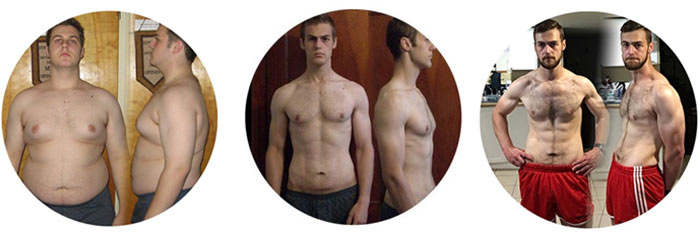
The Before Photo
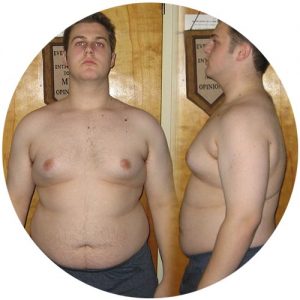 The “Before” photo was taken on my eighteenth birthday, in January of my first year at university.
The “Before” photo was taken on my eighteenth birthday, in January of my first year at university.
I weighed 255 lbs. I wore up to size 46 pants.
I had been overweight for pretty much my entire life by that point. It wasn't just a high school thing, or a temporary weight gain during a bad point in my life or something like that. It was definitely a “for as long as I can remember” kind of thing. For example, when I was 12 or 13, I asked my parents to take me to Weight Watchers. I lost 20 lbs., saw no difference in the mirror, so I quit. I also have a very unpleasant early memory of being made fun of in the swimming pool locker room by all the other boys for having “tits.” This would have been age 8 or even earlier. Hey-o, fat shaming! Get it started early, kids.
Also, note that 255 lbs. is not even the most I've ever weighed. That number would be about 275 lbs., some time during my final year of high school. I remember that moment very clearly, because I was so shocked by the number on the scale. It was an old analog scale, so I kept trying to “re-zero it” (i.e. setting the starting position to the negative side of zero) to try to get the number to go down. I remember this moment so clearly because the previous time I'd weighed myself I was in the 260s, and here I was in the mid-270s all of a sudden. Like I wasn't barely creepin' in “just” over 270, here: I was suddenly right there smack in the middle. There had to be a mistake, didn't there? Answer: Nope, no mistake. I recall weighing in again above 270 in the days or weeks that followed.
I suspect I lost a bit of weight during my first semester at university, as well as the summer before, when I worked for a moving company. (How I didn't lose even more weight during that summer… I don't even know. What was I eating?). I vaguely recall being “back” in the 260s around my first semester at university, when I tried a few more silly, not-very-well-thought-out attempts to lose weight, but I didn't start with the photos until my birthday in the new year, very shortly after getting back from Christmas holidays. That's a story in itself, but a large part of it was simply that my eighteenth birthday in January instilled a very real sense of If not now, then when? I'm an adult now. No one will do this “for” me.
In terms of what I did, I basically limited myself to only eating every 2.5 hours, and I gave myself very small meals. I embraced hunger. I basically was only eating processed carbs, and probably sub-1,000 calories each day. This is a terrible way to lose weight, but I had no idea. I didn't really suffer any losses of energy or anything like that, so I figured it was fine. I don't think I suffered any long-term consequences from how I did things, at least not anything beyond normal metabolic compensation.
The 1.5 Years Later Photo
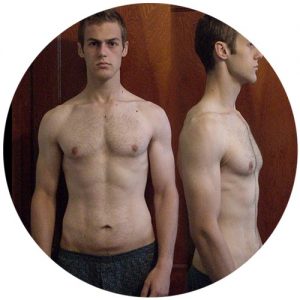 This 1.5 years later photo is me after about a year and a bit of semi-reasonable dieting (I started eating more after a few months), only to be followed up with a few weeks of trying to get “super totally ripped bro” After going it *mostly* on my own until then, I downloaded a meal plan and diet by a well-known guru in the fitness industry.
This 1.5 years later photo is me after about a year and a bit of semi-reasonable dieting (I started eating more after a few months), only to be followed up with a few weeks of trying to get “super totally ripped bro” After going it *mostly* on my own until then, I downloaded a meal plan and diet by a well-known guru in the fitness industry.
In this final “I want to get ripped” phase, I ended up eating something like ~1,400 to 1,500 calories per day, low carb, high protein, moderate to high fat. In the photo you see, I'm seven weeks into this final phase or diet. I was constantly tired, had low energy, I was extremely cold all the time, my sex drive plummeted (uh yeah, that sucked), I was often cranky, and I was obsessed with fitness and food. Before and after photos tend not to show these things.
(Note that I can still experience some of these symptoms if I take things too far, but I know how to recognize the physical symptoms as soon as they creep up. E.g., cold fingers and higher-than-normal hunger means it's either time for a spike meal, or just time to chill on the exercise, or even just to be more focused on my sleep habits.)
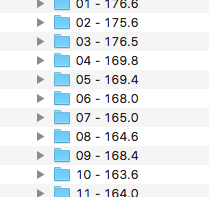
#illusionofcontrol
In the photo I'm 165.0 lbs. Yes, one-sixty-five “point zero.” Being that exact is silly for a number of reasons, but that's the way I recorded things, as I didn't know any better. It gives you what Scott Abel calls the illusion of control, but it's not real control. I had a digital scale by then, so all the numbers I still have recorded on my computer are like 169.4, 168.0, 165.0, 164.4. (I actually think the scale only gave even numbers whenever it went into decimals.) Again, it's all absurd, but I've kept them saved that way on my computer for posterity.
I was taking weekly photos, and continued doing so after the photo above, but what you see there is about the apex of my actual fat loss during that period. I continued losing weight in the weeks after the photos you see above (meaning: I continued losing water and muscle), but I also continued losing even more energy, and eventually I finally listened to my body and stopped *somewhat* with the obsession and the weekly photos. The lowest I got to around this time was about ~155 at a random, spur-of-the-moment weigh-in a few weeks after I'd stopped taking the regular photos and doing the obsessive weigh-ins. I hovered between 155 and 160 for awhile, and that's about the lowest I've been for any length of time.
Again, to be clear: I didn't look any better at 155 than I did at 164, and there is no way I could have maintained that weight. All my friends said I looked gaunt. Girlfriends said I looked gaunt. My parents said I looked gaunt. I didn't listen. I thought I was finally, finally starting to look thin. This accords with what anorexics often say and think, as well as what the dudes in the Ancel Keys study started experiencing. So, yeah, not really a great place to be in, mentally speaking.
How did I stop being so stupid? Um… very slowly.
I don't know how else to answer. There was no secret. I was aware that feeling like a cranky butt was not a good sign, but being willing to take what seemed to me like a step back to take a step forward was hard. Totally re-thinking what even counts as a step forward was harder still.
Also, it's been years, but I still get tempted now and again to go on a hard diet and get really totally super ripped… but I keep those kinds of thoughts in check.
The Now Photo
 The “Now” photo was taken in the summer of 2016. That's about 11 years after the first photo.
The “Now” photo was taken in the summer of 2016. That's about 11 years after the first photo.
To put this in realistic perspective, some notes about the photo:
I'm totally flexing a bit, and the lighting is good.
I didn't diet down or cut water or take diuretics or whatever the hell it is people do for these.
I probably weigh about ~175-180 lbs. here. I didn't weigh in that day, but that's roughly where I hover.
Yes, I'm covering up some loose skin on my lower belly (and yes, a bit of fat, too) with my shorts.
That “now” photo is what I mostly comfortably maintain.
Yes, I'm still trying to slowly improve over time, but I don't push my body too much past this or else it… well, let's say it pushes back. I have a setpoint I need to respect. I have too many responsibilities nowadays (loved ones, a career) to put up with losses of energy or concentration from unnecessary dieting past what my body thinks is healthy. It is difficult to get things done when all you can think about is food.
I workout regularly, and I implement regular calorie spike days (which are awesome and fun) but I don't stress about things, because I have habits in place that make maintenance and slow, steady improvement a part of my life.
Let me try to be really honest, though, about what I've done to keep the weight off for 10+ years.
My subjective experience tells me that, yes, it is much “easier” for me to maintain my weight now than it was when I first lost the weight.
However, at the same time, it's 11 years later, and in order to keep that weight off, I still do approximately one metric buttload of exercise, and yes, I eat mostly the same things six and a half days out of the week. I even still have habits that western culture would consider weird. For example, on days where I'm not having a calorie spike, I love going out to dinner with friends and ordering… just a diet Coke please, I already ate, thanks. My friends know this, and it's not a big deal. (It does mean I get less of a vote in terms of what restaurants we go to, which… yeah, that's fair.)
The success rate for losing weight and keeping it off is absurdly low. During the period in which I've lost the weight and kept it off, I have seen a variety of friends and family around me lose weight and gain it back. For someone with my starting BMI, the success rate for successful weight loss is 1 in 700 [link], and that's not even accounting for successfully keeping it off long-term.
What I'm trying to say is that, with all those things in mind, I think if you lose a bunch of weight, you do have permission to be a little bit weird, especially when the norms of our western culture promote obesity and crazy rampant body image problems. At the same time, however, thinking that way can be very dangerous: people with eating disorders think other people “just don't understand.” If the things you do to keep the weight off strain your personal relationships, you're probably going too far. (Yes, I have been there.)
Also, the mindset behind any “weird” behaviour is very important. You can have two people engaging in what looks like the exact same behaviour from an outside perspective, but if you could also see inside their head, you would see that one of them is well-adjusted, totally chill and healthy, while the other is falling deeper and deeper into an eating disorder. I am not immune to any of this, and I am constantly trying to do an honest self-check in this regard, to make sure I am doing the things I do for the right reasons.
As you can imagine, then, the general scope of the lifestyle changes I've made have been very permanent, even if the individual habits and such shift this way and that over the months and years as I iterate and optimize different elements, or integrate them with other ongoing small as well as larger changes in my life (moving cities, starting new careers, etc.). That accords with pretty much all the research I've seen on obesity and keeping weight off. The changes have to be permanent, and there are no ways around this.
The trick, for me, isn't that you can avoid permanent lifestyle changes like these; it's that you can implement mental and behavioural habits to make these things easier and much more “natural,” and you can do this in such a way that these things add to your life instead of just taking up all your time and energy. That's not easy.
In order to do this, in my own case at least, the first thing I need to do is get the diet and exercise side of the equation right. This means I can't do anything that turns me into a lethargic zombie with very cold extremities. I also have to get the approach to the diet and exercise side right. I have to be real and step back and ask when I'm just dieting to be vain, and I have to self-check to ensure the things I'm doing are adding to my life, not taking away from it.
That last bit is super important. For all the obesity researchers who look at those permanent, big scary lifestyle changes and think that means there's no hope for Joe Dieter or Jill Dieter… well, I suppose that's where I would disagree. Messages that give people problems with their body image are bad. Of course they are. But messages along the lines of “obesity can't be helped” can also be very damaging and extremely disempowering to people's sense of agency and to their internal locus of control over their own lives. That's there in the research too.
Before I give the wrong impression, and before any jerks get any ideas: messages like “overweight people just need more willpower,” or any messages that are basically just fat-shaming in disguise, are all much worse in terms of what it does to people's sense of agency and to that internal locus of control, so **** right off with those.
I'm also not saying this means we “hide the truth” of what the research shows (c'mon, give me a break), but we should be careful about framing what the research shows about obesity and metabolic compensation and all that. Taking away people's sense of control over their own life is something I think is really, really bad.
I really do think that if you're smart and strategic, and don't get caught up in emotional eating or body image issues, then the things you do for your fitness can add to your life and contribute to your other goals, not just sap away your time and effort.
Weight loss doesn't have to be all opportunity cost; it can be an investment that pays you back with fantastic ongoing dividends. No, this is not easy. Yes, there are lots of ways to screw it up. But it's do-able, and (in my opinion) worth it. This is also assuming you have reasonable goals, expectations, and — in general — a good head on your shoulders.
Do things right, and you experience awesome benefits rather than debilitating drawbacks. Instead of tired, lethargic, and basically zombified, you’re more productive, more focused, more alert, and less stressed. There are cognitive, chemical and hormonal benefits to doing things intelligently, and these kind of things will carry over to other aspects of your life.
To use an example from my own life, I don't think the lifestyle changes I “had” to make for fitness or weight loss “took away” from my academic work or goals in any way, shape or form. If anything, those fitness-related lifestyle changes helped me a tonne. They gave me an outlet for stress, which in turn instilled a sense of self-efficacy and control over external things I otherwise couldn't control. My fitness habits gave me structure, they gave me motivation and they taught me that I could be pro-active in going after goals I considered worthwhile.
Also, from a purely chemical or cognitive perspective, my exercise habits gave me more mental focus than I would have otherwise had. Most of my best and my weirdest high-concept ideas for my PhD thesis came on long runs while listening to iTunesU, podcasts, or audiobook versions of old Victorian novels. I would come home and dash to the computer, in order to get my thoughts out onto the page before they faded away. Sometimes I would come home and immediately pump out nearly 4,000 words of notes and ideas in an hour. Yes, that's basically constant typing for 60 minutes, and yes, I did this before showering! And yes, sometimes I went for more than an hour. Sometimes I cut a run short and headed home because I didn't want to lose an idea. My brain felt that on fire, and these instances have only happened “naturally” in the hours following a really good run. (I still do more resistance training than running, because there are both benefits and drawbacks to all these things, and you need to be real about all of them.)
Anyways, my point in this little rant is two-fold: (1) we should of course be real about weight loss, metabolism, body image and all those things, but (2) sure, part of “being real” involves discussing the difficulties, but it should also mean also focusing on the benefits of fitness and discussing how to better integrate those positive aspects into our lives. I think focusing on those carry over effects is one of the key ways to actually make weight loss sustainable.

